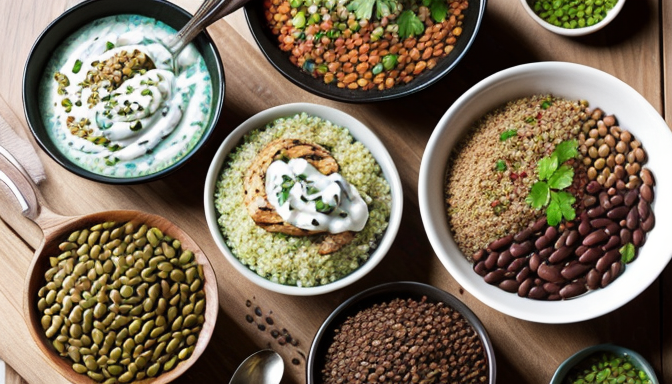Have you ever wondered why you can chow down on a plate of pasta and still feel hungry shortly after, while a simple chicken breast keeps you satisfied for hours? The secret lies in protein. This essential macronutrient plays a pivotal role in our diets, not just for building muscles but also for keeping our hunger at bay. When we consume protein, our bodies respond differently than when we eat carbs or fats. It’s like having a secret weapon against those pesky cravings!
So, what’s happening in our bodies when we eat protein? Well, it all starts with hormones. When you consume protein, your body releases hormones like glucagon-like peptide-1 (GLP-1) and peptide YY (PYY), which signal to your brain that it’s time to stop eating. These hormones work like traffic lights, telling your hunger to take a break. In contrast, carbohydrates can lead to a quick spike in blood sugar, followed by a rapid drop, often leaving you reaching for snacks sooner than you’d like.
Moreover, protein takes longer to digest compared to other macronutrients. Imagine it as a slow-burning fuel that keeps your energy levels steady, unlike the quick energy from carbs that can leave you crashing. It’s no wonder that people who include adequate protein in their meals often report feeling more satisfied and less likely to overeat later in the day.
In essence, if you’re looking to stay full and curb those cravings, incorporating protein-rich foods into your diet is a game-changer. Whether it’s a hearty breakfast of scrambled eggs or a post-workout shake, choosing protein can help transform your meals from fleeting satisfaction to lasting fullness.
The Science of Satiety
Understanding how satiety works is crucial for anyone looking to manage their weight or simply feel better after meals. Satiety is not just about eating; it’s a complex interplay of hormones, brain signals, and even the food we consume. When we eat, our bodies release hormones like ghrelin and leptin that communicate with our brain to signal hunger and fullness. Ghrelin, often dubbed the “hunger hormone,” spikes before meals and drops after we eat, while leptin, produced by fat cells, helps to tell our brain when we’ve had enough. This intricate dance is what keeps our appetite in check.
But what happens when we consume protein? Research shows that protein can significantly enhance feelings of fullness compared to carbohydrates and fats. Why is that? Well, protein-rich foods tend to take longer to digest, which means they keep our stomachs feeling fuller for a more extended period. Additionally, protein influences the release of hormones that promote satiety, making us feel satisfied after a meal.
To illustrate this, let’s compare the effects of different macronutrients on satiety:
| Macronutrient | Effect on Satiety |
|---|---|
| Protein | High satiety, reduces hunger hormones |
| Carbohydrates | Moderate satiety, can spike hunger later |
| Fats | Low to moderate satiety, often leads to overeating |
So, the next time you’re planning your meals, think about how protein can play a starring role in keeping you satisfied. It’s not just about filling your plate; it’s about filling your body with the right nutrients that can help you feel full longer and manage your hunger effectively.

Protein-Rich Foods
When it comes to feeling full and satisfied after a meal, play a starring role. But what exactly are these foods, and how can they help you manage your hunger? Well, let’s dive into the delicious world of protein! Imagine your plate filled with a variety of options that not only taste great but also keep you feeling full for longer. Some of the top contenders include lean meats, fish, dairy products, legumes, and nuts. Each of these food groups brings its own unique benefits to the table.
For instance, lean meats such as chicken and turkey are fantastic sources of protein, packing around 25-30 grams of protein per 100 grams. Fish, like salmon or tuna, not only offers protein but also provides essential omega-3 fatty acids, which are great for heart health. Dairy products, particularly Greek yogurt, are another excellent option, boasting around 10 grams of protein per 100 grams, along with probiotics that support gut health.
Let’s not forget about plant-based options. Legumes, such as lentils and chickpeas, are rich in protein and fiber, making them incredibly filling. A cup of cooked lentils can provide about 18 grams of protein! Nuts and seeds, while higher in calories, are packed with protein and healthy fats. Just a handful of almonds can give you around 6 grams of protein, plus they’re perfect for snacking!
To make it easier for you, here’s a quick comparison of protein content in some common protein-rich foods:
| Food Item | Protein per 100g |
|---|---|
| Chicken Breast | 31g |
| Salmon | 25g |
| Greek Yogurt | 10g |
| Lentils (cooked) | 9g |
| Almonds | 21g |
Incorporating these protein-rich foods into your meals can significantly enhance your satiety levels. So, the next time you’re planning your meals, think about adding a variety of these options to keep hunger at bay and enjoy a more satisfying dining experience!
Comparing Macronutrients
When it comes to feeling full, not all macronutrients are created equal. Protein, carbohydrates, and fats each play unique roles in our bodies, influencing hunger and satisfaction in different ways. Understanding these differences can help you make informed choices about your diet. Have you ever noticed how a protein-packed meal keeps you satisfied for hours, while a sugary snack leaves you craving more? That’s no coincidence!
To break it down, let’s take a closer look at how each macronutrient affects our satiety:
| Macronutrient | Satiety Level | Examples |
|---|---|---|
| Protein | High | Chicken, beans, eggs |
| Carbohydrates | Moderate | Rice, bread, pasta |
| Fats | Variable | Nuts, avocados, oils |
As you can see from the table above, protein consistently ranks high when it comes to keeping us full. It stimulates the release of hormones such as glucagon-like peptide-1 (GLP-1) and peptide YY (PYY), which signal to your brain that it’s time to stop eating. On the other hand, carbohydrates can cause quick spikes and drops in blood sugar, leaving you feeling hungry again sooner. Fats, while satiating, can vary widely in their effects depending on the type and quantity consumed.
So, next time you’re planning your meals, consider leaning more toward protein-rich options. Not only do they help stave off hunger, but they also provide essential nutrients that your body craves. It’s like having a reliable friend who always has your back in the battle against cravings!

Practical Tips for Incorporating Protein
Incorporating more protein into your diet doesn’t have to be a daunting task. In fact, it can be quite enjoyable! First off, consider starting your day with a hearty breakfast that includes protein. Instead of the usual sugary cereals, why not whip up some scrambled eggs or a protein-packed smoothie? Just imagine how much more energized and full you’ll feel throughout the morning!
Another great way to boost your protein intake is by making simple swaps in your meals. For instance, when you’re preparing a salad, toss in some grilled chicken or chickpeas. Not only will this enhance the flavor, but it will also keep you feeling satisfied longer. If you’re a fan of snacks, try reaching for Greek yogurt or a handful of nuts instead of chips or cookies. These options are not only delicious but also loaded with protein to curb those mid-afternoon cravings.
Don’t forget about the power of meal prep! By planning your meals ahead of time, you can ensure that you’re including a good source of protein in each one. You could create a weekly menu that features a variety of protein sources like fish, beans, and lean meats. This not only simplifies your cooking process but also keeps your meals interesting and nutritious.
Lastly, if you’re looking for a quick protein boost, consider incorporating protein powders into your diet. They can easily be added to smoothies, oatmeal, or even baked goods. Just remember to choose a quality product that fits your dietary needs. With these practical tips, you’ll find that increasing your protein intake can be both simple and satisfying!
Potential Downsides of High Protein Diets
While protein is a crucial component of our diets, too much of a good thing can lead to problems. Many people jump on the high-protein bandwagon, thinking it’s the magic bullet for weight loss and muscle gain. However, it’s essential to recognize that excessive protein intake can have some potential downsides that might surprise you.
First off, consuming a diet excessively high in protein can put a strain on your kidneys. Why? Because your kidneys are responsible for filtering out the byproducts of protein metabolism. Over time, this can lead to kidney damage, especially in individuals with pre-existing kidney conditions. It’s like asking a car to run on high octane fuel indefinitely—it can handle it for a while, but eventually, it will start to sputter.
Moreover, a high-protein diet often means you might be neglecting other essential nutrients. Carbohydrates and fats play vital roles in our bodies, too! If you’re not careful, you could miss out on important vitamins and minerals found in fruits, vegetables, and whole grains. This is akin to trying to build a house with just bricks; you need a solid foundation (other nutrients) to ensure it stands strong.
Additionally, some studies suggest that high protein intake may be linked to an increased risk of heart disease and certain types of cancer, particularly if the protein sources are primarily red or processed meats. It’s crucial to balance your protein sources and include healthy options like fish, poultry, legumes, and nuts.
In conclusion, while protein is undeniably important for our health, moderation is key. Aim for a balanced diet that includes a variety of nutrients to support overall wellness. After all, your body is a complex system that thrives on diversity, not just on one nutrient.
Frequently Asked Questions
- Why is protein important for feeling full?
Protein plays a crucial role in satiety because it takes longer to digest compared to carbohydrates and fats. This means that after a protein-rich meal, you’re likely to feel satisfied for a longer period, reducing the urge to snack unnecessarily.
- What are some high-protein foods I can include in my diet?
Great options for high-protein foods include chicken, fish, eggs, legumes, nuts, and dairy products like Greek yogurt. Incorporating these into your meals can significantly boost your protein intake and help keep you feeling full.
- How does protein compare to carbohydrates and fats in terms of satiety?
While all three macronutrients have their benefits, protein is often seen as the champion of satiety. Carbohydrates can lead to quick spikes and drops in blood sugar, leaving you hungry sooner, while fats, although satisfying, don’t provide the same fullness effect as protein does.
- Can I consume too much protein?
Yes, while protein is essential for health, excessive intake can lead to potential downsides, such as kidney strain or nutrient imbalances. It’s important to balance your protein consumption with other nutrients for overall wellness.
- What are some easy ways to increase my protein intake?
Simple tips include adding a scoop of protein powder to your smoothies, snacking on nuts or Greek yogurt, and choosing protein-rich grains like quinoa. Meal prepping with these foods can make it easier to hit your protein goals!

